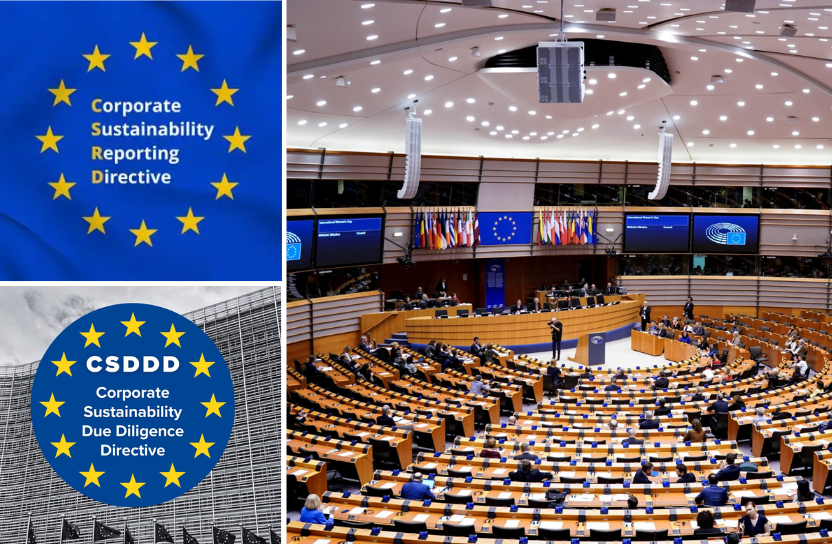Where are we at with Omnibus?
Published 2025-10-29 by Andrea Cantillo
Updated at 2025-10-30
There’s been a lot of attention in the last days around the 1st Omnibus, which modifies the CSRD and the Corporate Due Diligence Directive of the EU. We understand it can be complex to get an overall picture of what is going on and what it means for your company.
Here, our Climate Advisor Andrea Cantillo summarizes where the Omnibus stands now and what it means for companies.

The 1st Omnibus process is still ongoing
The 1st Omnibus process is still ongoing. It has not been paused or rejected by the Parliament nor any EU institution.
Under the EU process, the EU institutions — Commission, Council, and Parliament — need to agree on their own views of what a Directive should be before they come together and negotiate the outcome for the EU as a whole. This is the stage of the process we are at now. The Commission's position is the Omnibus proposal, the Council has adopted its view, and the Parliament is deciding what it’ll stand for.
Negative vote on October 21st
Last week, on October 21st, a negative vote in Parliament drew attention. This vote meant that the position proposal reached in the JURI Committee of the Parliament was not one that the Majority of Members of the European Parliament felt comfortable with. The resulting negative vote means that negotiations within Parliament on their stance will restart, and the result is expected to be voted on the 13th of November.
Why did some MEPs vote no?
- The Greens/EFA did not agree with the content nor the process of the lead negotiator, Jörgen Warborn, followed to reach that agreement in the committee.
- The extreme right, suspected to have voted no per their petition to keep votes secret, allegedly wants to see the directives vanish overall.
It is important to note that the elected politicians in the MEPs and Council, and the EU Commission, are deciding which companies need to comply with CSRD and CSDD. But the substance of what companies need to comply with, or not, under both directives is divided.
What about the substance?
- The substance of what companies should report under CSRD, and what they should not, is being decided in another space by technical experts at EFRAG. They are tasked with making the reporting easier for companies, regardless of the companies that will end up having to report or not. EFRAG will give their final technical advice to the EU Commission on the 30th of November.
- The substance of what companies should do under the CSDDD is also part of the negotiations within the EU Institutions (Commission, Parliament and Council).
What does this mean for companies?
There are no answers yet on which companies are to comply with CSRD or CSDDD, nor exactly what they will comply with. However, this is not a hopeless situation.
A ‘unified’ decision by all EU institutions is expected to come early 2026 once the negotiations among all institutions are finalized. As there has been an agreement to postpone their implementation until 2028 for those who have not yet been required to report, this should provide enough time for companies to adapt.
Raise your voice: Reach out to MEPs
You still have the chance to reach out to MEPs and share what you think about the Omnibus proposal with them, so that your views are included in the EU process and decisions.
You can tell them that:
- You support, and would like to add your voice to, the Statement from 480 EU companies, including IKEA, Vatenfall and H&M Group signed to express what they would like to see as a result.
- Simplification should improve content, not reduce the number of companies addressing climate and sustainability impacts.
- The European Central Bank has warned that cutting 80% of the companies which need to comply with CSRD risks a “lack of sound and comparable data which may limit credit institutions’ ability to effectively manage sustainability risks, leading to risks to financial stability and to the wider economy”
- See other possible messages & templates for an email
The leading negotiators and party leaders are the ones to contact (click on the links to find their email adresses)
- Leading negotiators: ✉️ Jörgen Warborn, ✉️ René Repasi, ✉️ Kira Marie Peter-Hansen, ✉️ Pascal Canfin.
- Party leaders: ✉️ Mandred Weber, ✉️ Valérie Hayer, ✉️ Iratxe García Pérex, ✉️ Bas Eickhout, ✉️ Terry Reintke.